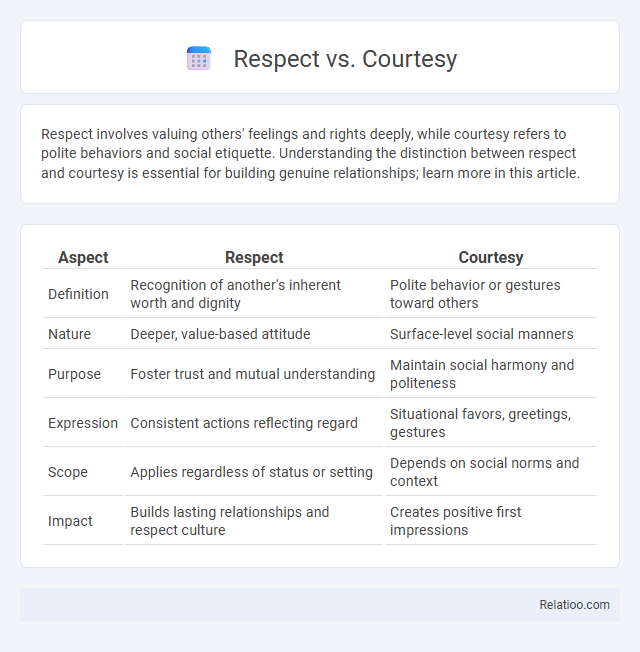Respect involves valuing others' feelings and rights deeply, while courtesy refers to polite behaviors and social etiquette. Understanding the distinction between respect and courtesy is essential for building genuine relationships; learn more in this article.
Table of Comparison
| Aspect | Respect | Courtesy |
|---|---|---|
| Definition | Recognition of another's inherent worth and dignity | Polite behavior or gestures toward others |
| Nature | Deeper, value-based attitude | Surface-level social manners |
| Purpose | Foster trust and mutual understanding | Maintain social harmony and politeness |
| Expression | Consistent actions reflecting regard | Situational favors, greetings, gestures |
| Scope | Applies regardless of status or setting | Depends on social norms and context |
| Impact | Builds lasting relationships and respect culture | Creates positive first impressions |
Understanding Respect: Definition and Importance
Respect involves recognizing the inherent worth and rights of individuals, fostering mutual trust and positive relationships. It goes beyond politeness or courtesy by demanding genuine acknowledgment of others' values, beliefs, and boundaries. Understanding respect is crucial for creating inclusive environments where people feel valued and empowered.
What is Courtesy? Exploring Its Meaning
Courtesy represents the polite behavior and gestures you show toward others, embodying kindness and good manners in everyday interactions. It involves actions such as saying "please" and "thank you," holding doors open, and listening attentively, which foster positive social exchanges and mutual respect. Understanding courtesy helps you create a respectful environment by demonstrating thoughtfulness and regard for others' feelings.
The Key Differences Between Respect and Courtesy
Respect involves recognizing the inherent worth and rights of others, often rooted in deep moral values and long-term behavior. Courtesy refers to polite actions and social etiquette that demonstrate good manners in daily interactions but may not imply deeper acknowledgment of another's character. Your understanding of these distinctions helps navigate social and professional relationships effectively, ensuring appropriate behavior based on context.
Why Respect Matters in Relationships
Respect forms the foundation of healthy relationships by acknowledging others' inherent worth and empowering mutual trust. It fosters open communication, reduces conflicts, and strengthens emotional bonds, making interactions more meaningful and supportive. Without respect, relationships risk becoming superficial, as courtesy and consideration alone cannot sustain genuine connection or resolve deeper issues.
The Role of Courtesy in Social Interactions
Courtesy plays a crucial role in social interactions by facilitating positive communication and mutual understanding through polite behavior and respectful gestures. It functions as the outward expression of respect, ensuring interactions remain harmonious and free from conflict. Practicing courtesy strengthens social bonds by showing consideration for others' feelings and cultural norms.
Examples of Respect in Everyday Life
Respect in everyday life is shown when you listen attentively during conversations, honor personal boundaries, and acknowledge others' opinions even when they differ from your own. Offering a seat to an elderly person on public transport or addressing people politely using their preferred names also exemplify respect. These actions demonstrate a fundamental recognition of others' dignity and values, fostering positive social interactions.
Demonstrating Courtesy: Practical Scenarios
Demonstrating courtesy in practical scenarios means showing polite behaviors such as greeting colleagues warmly, listening attentively during conversations, and offering help without being asked. Your ability to express simple gestures like saying "please" and "thank you" can foster a positive environment and encourage mutual respect. Consistently practicing courtesy bridges gaps between respect and consideration, creating smoother interpersonal interactions.
Can You Have Courtesy Without Respect?
Courtesy involves polite actions or words expected in social interactions, while respect stems from recognizing someone's value or qualities. You can show courtesy without respect by adhering to social norms or manners despite lacking genuine admiration for the person. However, true respect deepens the meaning of courteous behavior, making it sincere rather than merely perfunctory.
Building a Culture of Respect and Courtesy
Building a culture of respect and courtesy involves fostering mutual understanding, valuing diverse perspectives, and promoting consistent positive interactions. Respect emphasizes recognizing and honoring individual worth, while courtesy manifests through polite behaviors and thoughtful communication that ease social exchanges. Consideration integrates attentiveness to others' needs and feelings, creating an environment where individuals feel valued and supported, enhancing workplace cohesion and collaboration.
Balancing Respect and Courtesy in Modern Society
Balancing respect and courtesy in modern society requires understanding that respect involves recognizing others' inherent worth, while courtesy emphasizes polite behaviors that foster positive interactions. Your ability to navigate social dynamics effectively depends on integrating genuine respect with thoughtful manners, enhancing both personal and professional relationships. Emphasizing empathy and active listening further strengthens this balance, promoting a harmonious and inclusive environment.

Infographic: Respect vs Courtesy
 relatioo.com
relatioo.com